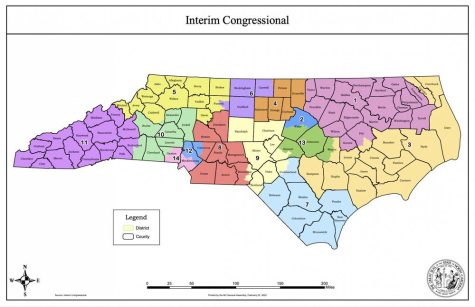Senator Wiley Nickel on the NC Redistricting Decision
After the NC GOP brought the new NC court-drawn redistricting maps to the national Supreme Court, the court ruled on March 7th that the court-drawn maps were constitutional. This ruling finalized North Carolina’s redistricting maps and confirmed the Democratic Party’s victory in ensuring competitive maps after a long, uphill battle.
“We had to fight the maps over and over, we stood united as Democrats in opposition to the maps and then went to the courts,” said Senator Wiley Nickel, who is currently representing the Cary area in the NC Senate and recently filed paperwork to run for the newly drawn 13th congressional district. In a Wake County Association of Teen Democrats meeting on the 7th, Senator Nickel spoke about the importance of this redistricting decision.
Speaking on how the previous GOP-drawn map reached NC’s Supreme Court, Senator Nickel said, “The main group was the League of Conservation Voters, they filed a lawsuit with a number of plaintiffs, claiming that maps violated their constitutional rights to have a free and fair election, and the courts agreed. They said the maps that the Republicans drew were essentially eleven seats for Republicans and three seats for Democrats, which were unconstitutional. Then the Republicans drew new maps, they weren’t good enough and the courts just drew them on their own in the last go-around.”

The new court-drawn congressional map includes seven seats that will most likely be won by Republicans and six by Democrats. The new 13th district is the one toss-up seat. “It’s a seat that Biden won 50-48 [percent], it’s trending the right way with lots of growth but it’s going to be terribly important, it will be the most competitive congressional race in North Carolina, maybe even in the country,” said the Senator. Senator Nickel’s campaign is facing a unique challenge, as the 13th district has no incumbent and spans over a wide area: the lower half of Wake County, all of Johnston County, and approximately half of both Harnett and Wayne counties.
“We’ve got a really important race for congress coming up here in Wake County and Johnston county. It’s one that literally could determine control of the US House of Representatives, it could be that close.”
In a summarization of how redistricting is supposed to work, Senator Nickel explained that the districts are supposed to involve “communities of interest,” like college towns, for example. “When you’re drawing a fair map, you want to keep communities together,” said the Senator. Senator Nickel further elaborated that in the past, Republicans have been known to split communities of interest in their maps. Another example of this was seen in the previous Republican-drawn maps, which Democrats claim split Greensboro in half to undermine its historically large Black population.
On the importance of these local elections, Senator Nickel stated, “There’s going to be some [local elections] that are really important, very competitive that will determine if we can get the majority in the legislature, or more importantly if we can get enough seats to sustain vetoes by Governor Cooper, that’s the real important thing.” Since the beginning of Governor Roy Cooper’s term, Democrats have depended on their presence in the NC Senate to support Cooper’s vetoes, or power to reject opposing legislature. With a GOP-dominated state government, Cooper’s vetoes are absolutely essential to the efforts of NC Democrats.
After decades of heavily gerrymandered districts, NC Democrats are mostly content with the Supreme Court’s decision and are hopeful for the future.
“We’re really glad with the maps we have, they’re fair maps and we’re excited about a chance to run this campaign.”
Your donation will support the student journalists of Enloe Magnet High School, allowing us to cover our annual website costs. We are extremely grateful for any contribution, big or small!

(He/him)
Matthew is a senior and is very excited to be the news editor this year! He loves writing about political issues and local news. Outside of...









